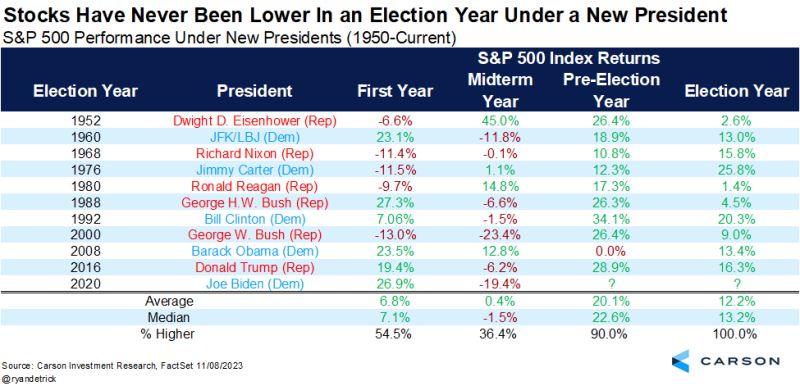5 reasons why 2024 will be a "stock picker's paradise"
For all the discussion at the start of 2023 that this year would be another tough year for equities, the market-capitalisation-weighted S&P 500 seems to have done the opposite. It is up 18% this year. And before you say that the rally has been driven only by the Magnificent Seven, that may be true but the equal-weighted S&P 500 is up 3% year-to-date.
In other words, it is hardly the mild or even deep drawdown that many analysts were forecasting at the end of 2022.
Savita Subramanian, who heads the Bank of America US equity and quant strategy team, was one of the analysts who was projecting mild caution. The S&P 500 closed last year at around 3,900, and back then, Subramanian was forecasting that the index would close at 4,000 by the end of 2023.
Oh, how times (and resilient corporate earnings) have changed all that.
Subramanian now argues we may see a "stock picker's paradise" next year, leading the S&P 500 to a 5,000 year-end target. Not only that, she believes the S&P 500 will get there without Federal Reserve rate cuts.
In this wire, I'll summarise Subramanian's thinking - and share some sectors they are watching closely.
The money line
The title of the note itself is "New highs, stock picker's paradise":
"We forecast 5000 by year-end 2024 for the S&P 500 (+10% from today). The equity risk premium could fall further, especially ex-Tech: we are past peak macro uncertainty. The market has absorbed significant geopolitical shocks already and the good news is we're talking about the bad news. Macro signals are muddled, but idiosyncratic alpha* increased this year. We're bullish not because we expect the Fed to cut, but because of what the Fed has accomplished."
*Idiosyncratic alpha = the return you get from doing something different (i.e. picking different stocks, doing extra research into finding the very best investment opportunities)
Five reasons why the S&P 500 will hit its target
#1 "Too many skunks at the garden party"
In a slight jab at the institutional investor crowd, Subramanian and her team argue that the largest investors are still underweight equities in a way not seen for 25 years. And when the largest investors are not buying, that's hardly a sign that a bull market is ending.
"Pension equity weights are at 25-year lows, sell-side market targets are mostly underwater, consensus long-term earnings growth for the S&P 500 is at its lows, and active funds are hugging their benchmarks," Subramanian said.
"Bull markets typically end with high conviction and euphoria - we are far from that," she added.
#2 Bottom-up analysis suggests "corporate Goldilocks"
Within this reason are four sub-reasons that the team's analysis suggests add up to strong fundamentals among US companies.
- Decelerating but not declining prices
- Higher margins
- Continued wage inflation has been offset by:
- Efficiency gains and falling costs
The profit recession is over, and BofA says EPS can grow even as the economy slows.
Although it can be a dangerous idea, BofA says a past recession can provide clues to the situation we are going through today:
"The 1950s establishes precedent: EPS troughed six quarters before the recession and continued to grow during the recession. The normalization [sic] in goods vs. services also bodes well for earnings,' Subramanian wrote.
The only problem? 2024 is not the 1950s - and too much has fundamentally changed since then. But history tends to rhyme, right?
#4 Election years have been good for equities (usually)
Despite the constant concerns around political gridlock, shutdowns, and worries about the fiscal health of the United States government, election years do tend to be good years for equities. To prove this, here are two charts from Ryan Detrick (then at LPL Research, now at Carson Financial Group) who has looked at the performance of the S&P 500 during election years.

The S&P 500 also tends to do well when a new President is elected in an election year - no matter who the President is.

Finally - and perhaps understandably given it is the Bank of America - the team argue that US exceptionalism is intact.
This reasoning is driven by the ongoing reshoring (i.e. deglobalisation or relying less on China) trend as well as the bumpy road being experienced by companies attempting to de-dollarise (i.e. detach themselves from the US Dollar as the world's reserve currency). Higher oil prices are also providing a tailwind for US-based energy companies. Lastly, they argue that the great wealth transfer from older generations to millennials has begun in the States, with an estimated US$80 trillion on the line.
So where are BofA investing?
The team are finding most of their opportunities in four overweight sectors. The four are:
- Energy: High oil prices, inflation-protected yield, and weakening US Dollar are all tailwinds
- Consumer discretionary: The Fed is done with rate hikes, housing stocks to benefit from structural shortages and relatively resilient consumers
- Financials: Contagion risk has been mitigated, High-quality earnings are available for lower price (i.e. relatively inexpensive), margins helped by higher interest rates
- Real Estate/REITs: Large dividend yields and too unloved to ignore - but naturally, refinancing remains the single biggest risk.
As a final supplementary note, the Bank of America economics team believe the first rate cut from the Federal Reserve will come in mid-2024, but won't rule out entirely another hike as soon as the December meeting.
2 topics

